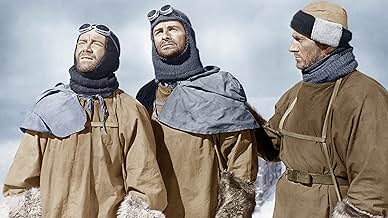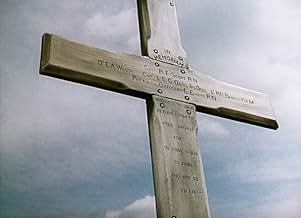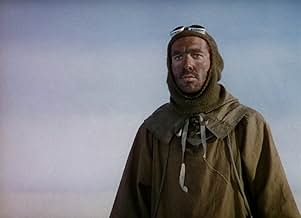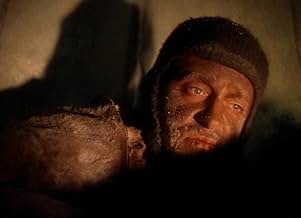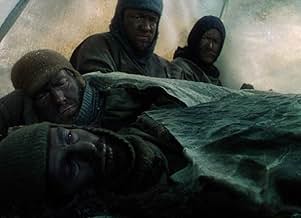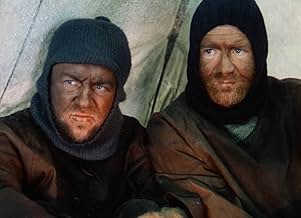IMDb रेटिंग
7.0/10
2.7 हज़ार
आपकी रेटिंग
अपनी भाषा में प्लॉट जोड़ेंThe story of British explorer Robert Falcon Scott's 1912 expedition and his quest to be the first to reach the South Pole.The story of British explorer Robert Falcon Scott's 1912 expedition and his quest to be the first to reach the South Pole.The story of British explorer Robert Falcon Scott's 1912 expedition and his quest to be the first to reach the South Pole.
- निर्देशक
- लेखक
- स्टार
- 1 BAFTA अवार्ड के लिए नामांकित
- 1 जीत और कुल 2 नामांकन
James McKechnie
- Surgeon Lt. E.L.Atkinson R.N.
- (as James Mc Kechnie)
फ़ीचर्ड समीक्षाएं
Scott of the Antarctic is a flawed but compelling and beautifully made film, that is definitely worth seeing. The pacing is rather pedestrian in places, the film does sort of idealise the character of Robert Falcon Scott and there is one or two meanderings in the story. Flaws aside, the special effects are absolutely incredible, even for back then, the cinematography is very skillful, the scenery is splendid and the score is resolutely haunting. Also very well done is the focused direction and the compelling performances of John Mills, James Robertson Justice, Diana Churchill and Kenneth More. And there are excellent values portrayed throughout, achievement, triumph, friendship and endeavour, consequently the film's ending is quite moving to say the least. All in all, it isn't perfect but it is worth seeing for the acting and the effects. 7/10 Bethany Cox
There is a general feeling, already noted here, that this film whitewashes Scott and turns him into a heroic figure. This is not surprising when you consider that when it was being made survivors of the expedition and relatives of those who died (particularly Kathleen Scott) were still alive.
Nevertheless, the film does raise some questions about Scott's leadership and judgement: his desperation to be first at the Pole with inadequate planning and resources; his last-minute decision to take a fifth man to the Pole when supplies had been calculated for a four-man team; the fact that none of these questionable decisions are challenged by subordinates bound by Royal Navy discipline.
The scenes at the Pole are particularly telling. When the British reach the Norwegian camp it is Wilson who enters their tent, while Scott tells Bowers to "check the position". Wilson's look of disgust emphasises Scott's refusal to face hard reality at a critical moment.
So, yes, this is the story of a "national hero", but watch it with care and it is far from uncritical.
Nevertheless, the film does raise some questions about Scott's leadership and judgement: his desperation to be first at the Pole with inadequate planning and resources; his last-minute decision to take a fifth man to the Pole when supplies had been calculated for a four-man team; the fact that none of these questionable decisions are challenged by subordinates bound by Royal Navy discipline.
The scenes at the Pole are particularly telling. When the British reach the Norwegian camp it is Wilson who enters their tent, while Scott tells Bowers to "check the position". Wilson's look of disgust emphasises Scott's refusal to face hard reality at a critical moment.
So, yes, this is the story of a "national hero", but watch it with care and it is far from uncritical.
OK, we've heard a lot about the "real" history and the debate over whether Scott was a hero or a complete imbecile. Whatever the truth is and whatever revisionist or hagiography history is being peddled, "Scott Of The Antarctic" is a beautifully made film: One of the best looking early colour films which evokes a bye-gone era and is strangely compelling and haunting at the same time. The music by Vaughn-Williams, the greatest British classical composer of his time, is powerful and, again, haunting. In some scenes, they've recreated exactly some of the photos taken during the Scott expedition. The casting is spot on; look at the original photos and Millsy is uncannily like Scott, Kenneth More is Teddy Evans, Reginald Beckwith and James Robertson Justice do their real counterparts well and John Gregson, in one of his first film roles, captures Tom Crean perfectly (compare his performance with Paul McGann's Crean in "Shackleton", which was pretty good). Many film critics feel that "Scott of the Antarctic" was somewhat robbed at the 1949 Oscars.
The first thing to remember is that Scott fouled up mightily in his attempt to be the first to reach the South Pole in 1912. He was stubborn, rather arrogant, yet malleable to the wishes of his wife. When his diaries were found on his frozen remains they were in fact later edited and altered by his wife (and the publisher) to depict Scott as a Great Heroic Figure. That was a lie; the depiction of him in the movie is a lie. And in recent years the unedited diaries were released proving the old myth was not the reality. It should be added the U.S. polar explorer Richard C. Byrd was an even bigger fraud - as his recently released personal notes also demonstrated.
This film is generally well done, and the Antarctic (actually Greenland, I believe) scenery is spectacular. The very slow deterioration of Scott's team is fascinating to see; their heartbreak upon viewing Raoul Amundsen's Norwegian flag flying over the Pole in the distance - meaning they had lost the race to the greatest of all explorers - is palpable. From then on it becomes a matter of survival and getting back home. Bit by bit the elements wear them down - untill they can finally go on no longer. When one says "I don't want to wake up tomorrow" with the wind howling just outside their little tent as they try to eat a morsel of cold food. . . you know it's over for them. Heartbreaking.
BUT THE CAUSE OF THE DISASTER IS NOT DELINEATED!! WHY did it happen? Bad luck? Scott's decision not to rely only on sled dogs? Yes. But his planning and leadership was also flawed badly - and that was not shown, as mentioned above.
I had no particular problem with the acting. It could possibly have been more emphatic and emotive, but then I assume the English were indeed as stoic as depicted in the film. Mills' understated Scott is to be expected as part of the MYTHICAL version of Scott - the REAL Scott I have no doubt was more emotional and weaker, as seen in the uneditied diary.
All in all, a moving film worth seeing - so long as you know this is not the reality of the Scott expedition but the cleansed version to make Scott and company as heroic as possible. If you want a better Arctic film try "The Red Tent", and check the reviews on the IMDb for background on it.
This film is generally well done, and the Antarctic (actually Greenland, I believe) scenery is spectacular. The very slow deterioration of Scott's team is fascinating to see; their heartbreak upon viewing Raoul Amundsen's Norwegian flag flying over the Pole in the distance - meaning they had lost the race to the greatest of all explorers - is palpable. From then on it becomes a matter of survival and getting back home. Bit by bit the elements wear them down - untill they can finally go on no longer. When one says "I don't want to wake up tomorrow" with the wind howling just outside their little tent as they try to eat a morsel of cold food. . . you know it's over for them. Heartbreaking.
BUT THE CAUSE OF THE DISASTER IS NOT DELINEATED!! WHY did it happen? Bad luck? Scott's decision not to rely only on sled dogs? Yes. But his planning and leadership was also flawed badly - and that was not shown, as mentioned above.
I had no particular problem with the acting. It could possibly have been more emphatic and emotive, but then I assume the English were indeed as stoic as depicted in the film. Mills' understated Scott is to be expected as part of the MYTHICAL version of Scott - the REAL Scott I have no doubt was more emotional and weaker, as seen in the uneditied diary.
All in all, a moving film worth seeing - so long as you know this is not the reality of the Scott expedition but the cleansed version to make Scott and company as heroic as possible. If you want a better Arctic film try "The Red Tent", and check the reviews on the IMDb for background on it.
The Ealing Studios production `Scott of the Antarctic' is a work of art and an inspiration to human achievement. The film depicts the polar explorers of the Second Scott Antarctic Expedition (1910-1913). They are portrayed first as pygmies against the terrible backdrop of the ice continent, then as dauntless giants within the enclosed spaces of their fragile tents as they await their certain death.
The mood of the film is High Victorian, although strictly speaking the setting is Late Edwardian. Edward Adrian Wilson, the artist, played by Harold Warrender, is the quintessential gentleman naturalist. As the film begins, Wilson is shown in the summery garden of his tranquil country homestead in England, meticulously creating a scientific illustration of a mounted bat. At the end, when Wilson is among the few remaining explorers who face frozen death in their wind-whipped tent, his spirit drifts away to his English home.
The Victorian faith in mechanisms is brought forth by close up shots of distance-measuring wheels that are attached to the backs of clumsy man-drawn sledges, and by the heroic but flawed powered tractors that break down in the awful cold.
The film invites the viewer to arrive at his or her own conclusions about the character of Captain Scott. The film makes no judgments - it merely portrays Scott through the superb acting of John Mills.
`Scott of the Antarctic' is a timeless film about eternal values: human endeavor, achievement and triumph.
The mood of the film is High Victorian, although strictly speaking the setting is Late Edwardian. Edward Adrian Wilson, the artist, played by Harold Warrender, is the quintessential gentleman naturalist. As the film begins, Wilson is shown in the summery garden of his tranquil country homestead in England, meticulously creating a scientific illustration of a mounted bat. At the end, when Wilson is among the few remaining explorers who face frozen death in their wind-whipped tent, his spirit drifts away to his English home.
The Victorian faith in mechanisms is brought forth by close up shots of distance-measuring wheels that are attached to the backs of clumsy man-drawn sledges, and by the heroic but flawed powered tractors that break down in the awful cold.
The film invites the viewer to arrive at his or her own conclusions about the character of Captain Scott. The film makes no judgments - it merely portrays Scott through the superb acting of John Mills.
`Scott of the Antarctic' is a timeless film about eternal values: human endeavor, achievement and triumph.
क्या आपको पता है
- ट्रिवियाCaptain Scott's log and many of the personal effects of the explorers were loaned by The British Museum to add to the authenticity of this near-documentary.
- गूफ़No one's breath is ever visible in the Antarctic.
- भाव
Capt. L.E.G. Oates: I'm just going outside; I may be away some time.
[as he leaves tent for certain death]
- क्रेज़ी क्रेडिटRalph Vaughan Williams, then revered as Britain's greatest living composer, has an official credit consisting only of his surname, 'Vaughan Williams'.
- कनेक्शनFeatured in Antarctica (1991)
- साउंडट्रैकWill Ye No Come Back Again?
(uncredited)
Traditional Scottish tune, and lyrics by Lady Carolina Nairne (as Carolina Oliphant, Lady Nairne)
Heard as the ship leaves New Zealand
टॉप पसंद
रेटिंग देने के लिए साइन-इन करें और वैयक्तिकृत सुझावों के लिए वॉचलिस्ट करें
- How long is Scott of the Antarctic?Alexa द्वारा संचालित
विवरण
बॉक्स ऑफ़िस
- बजट
- £23,70,000(अनुमानित)
- चलने की अवधि
- 1 घं 51 मि(111 min)
- पक्ष अनुपात
- 1.37 : 1
इस पेज में योगदान दें
किसी बदलाव का सुझाव दें या अनुपलब्ध कॉन्टेंट जोड़ें

